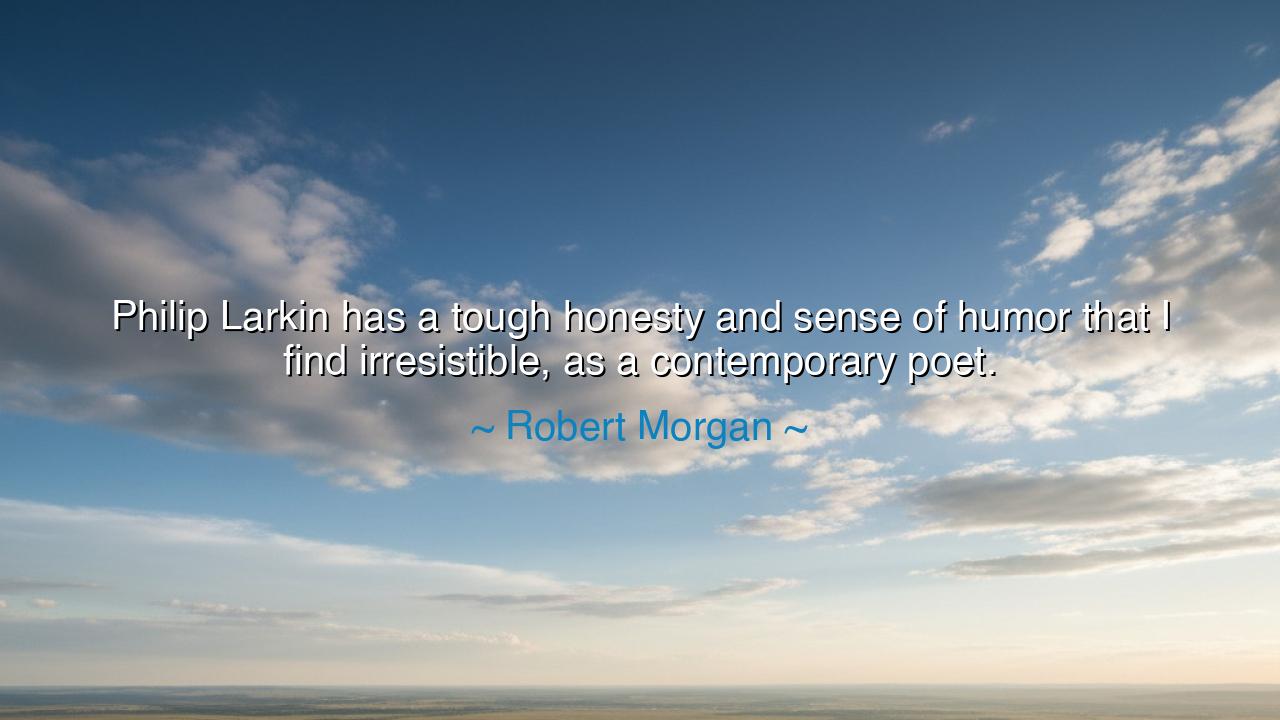
Philip Larkin has a tough honesty and sense of humor that I find
Philip Larkin has a tough honesty and sense of humor that I find irresistible, as a contemporary poet.






In the words of Robert Morgan, there resounds a quiet reverence for truth wrapped in art: “Philip Larkin has a tough honesty and sense of humor that I find irresistible, as a contemporary poet.” Though spoken of another, these words reveal the eternal struggle and triumph of all who dare to speak plainly in a world that hides behind comfort. In them lies the recognition that honesty, when joined with humor, becomes not harshness but light — a way of piercing illusion without cruelty, of showing the rawness of life and still finding a reason to laugh. It is a tribute not only to Larkin, but to the ancient calling of the poet: to speak truth, even when truth is unwelcome, and to speak it beautifully.
Philip Larkin, whose voice was both tender and unflinching, wrote of ordinary lives with extraordinary clarity. He looked upon existence — its routines, its disappointments, its fleeting joys — and saw not tragedy alone, but the strange comedy that dwells within human imperfection. His honesty was not the cold blade of judgment, but the mirror held up to the soul. In poems like “Aubade” or “The Whitsun Weddings”, he confronted mortality, loneliness, and love without disguise, yet always with a glimmer of wit — the laughter that comes not from mockery, but from understanding. It is this balance, this union of candor and compassion, that Robert Morgan finds irresistible: the rare courage to tell the truth without losing warmth.
The ancients, too, revered this kind of courage. The philosopher Diogenes, who lived in a barrel and mocked the vanity of Athens, spoke truth with the same biting humor that made men both laugh and tremble. When Alexander the Great stood before him and asked if there was anything he desired, Diogenes replied, “Yes — stand out of my sunlight.” Like Larkin, he possessed the tough honesty that exposes pretension, and the humor that softens the sting of revelation. Both understood that laughter and truth are not enemies but allies, each illuminating the other. For laughter frees the heart to accept what the mind resists, and truth, when wrapped in wit, enters the soul like light through a window instead of a wound.
Robert Morgan, himself a poet of clarity and reverence for nature, saw in Larkin a kindred spirit — a craftsman who did not adorn life with lies. In calling him a contemporary poet, Morgan acknowledges that Larkin’s truth was not bound by time, for all ages have need of such voices. Every generation, seduced by illusion, must be reminded that to see the world clearly is not to despair, but to awaken. The poet, then, becomes a priest of reality — translating the mundane into meaning, and reminding the world that beauty does not need perfection to exist.
This tough honesty, however, is not easy. It demands that one stand apart, refusing the comfort of false hope or easy praise. Philip Larkin was often misunderstood — some found him too bleak, too unwilling to cloak his vision in romance. Yet this is the mark of all truth-tellers throughout history. Think of Socrates, condemned for questioning what others accepted blindly, or Emily Dickinson, whose solitude gave her poetry its luminous precision. Such souls bear the burden of seeing too clearly, yet gift the world the medicine it needs: words that cleanse rather than flatter.
And yet, what redeems this honesty — what makes it not cruelty but wisdom — is humor. Humor is the sign that one’s truth is tempered with mercy. The man who can laugh at life has not surrendered to bitterness; he has found a way to hold the darkness lightly. In Larkin’s humor, as in the laughter of the wise, there is tenderness — the recognition that all are flawed, all are struggling, and therefore all are worthy of understanding. This, perhaps, is what Robert Morgan meant by “irresistible”: that rare alchemy of mind and heart, intellect and empathy, that makes truth bearable and beautiful.
So let this be the lesson, O listener: seek the tough honesty that does not lie to please, and the sense of humor that does not mock to wound. Speak truth, but with warmth; see life as it is, but do not forget to smile at its absurdity. Let your words, like Larkin’s, be both mirror and balm — revealing, yet healing. For it is not the poet alone who must learn this balance, but every soul who would live fully awake.
And remember: the world will always need those who, like Philip Larkin, dare to look upon it clearly, and those who, like Robert Morgan, know how to cherish such clarity. For in a time of noise and pretense, the union of truth and laughter is a sacred act — the song of the honest heart, still shining, still human, still free.






AAdministratorAdministrator
Welcome, honored guests. Please leave a comment, we will respond soon